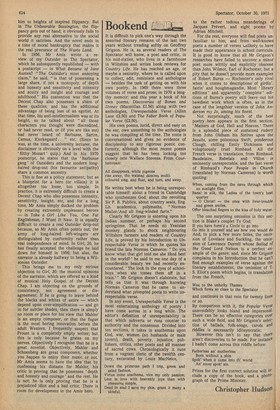Bookend
It is difficult to pick one's way through the assorted literary remains of the last two years without treading softly on Geoffrey Grigson. He is, as several readers of The Spectator will know, a poet and critic, in his mid-sixties, who lives in a farmhouse in Wiltshire and writes book reviews for Country Life. He has reached an age, or maybe a seniority, where he is called upon to collect, edit, reminisce and anthologise — besides the task of getting on with his own poetry. In 1969 there were three volumes of verse and prose; in 1970 a lengthy memoir; and this year a book of his own poems, Discoveries of Bones and Stones (Macmillan £1.50) along with two anthologies, Unrespectable Verse (Allen Lane £2.50) and The Faber Book of Popular Verse (£2.50).
His own poems, lucid, direct and easy on the ear, owe something to the anthologies he was compiling at the time. The voice is conversational and gives no evidence of discipleship to any rigorous poetic conformity, although the most recent poems suggest that he has been looking too closely into Wallace Stevens. From Courtanvaux:
All disappears, white pigeons rise away, the waisted dancers multi
coloured sing, and float, and turn, and sway.
He writes best when he is being unrespectable himself: about a friend in Cambridge who synthesizes God, about the revolting Sir P. B. Publico, about country seats, Eng. Lit, academics, polymaths, "Norman Mailer/And all long-winded farts."
Clearly Mr Grigson is entering upon his Indian summer, or perhaps his second springtime. That he needs no Yeatsian monkey glands to shock neighbouring Wiltshire farmers and readers of Country Life, is proved by his Introduction to Unrespectable Verse in which he quotes his friend the late Norman Cameron: "Do you know what that girl told me she liked best in the world?' he said to me one day of a considerable beauty we had recently encountered. 'The look in the eyes of schoolboys when she tosses them off in a train.'" Mr Grigson doesn't elaborate, but tells us that it was through knowing Norman Cameron that he came to understand what prompted poets to write unrespectable verse.
In any event, Unrespectable Verse is the most entertaining anthology of poetry I have come across in a long while. The editor's definition of unrespectability is that which subverts or runs counter to authority and the consensus. Divided into ten sections, it takes in anathemas upon God, war, women (no husbands or male lovers), death, poverty, injustice, publishers, critics, other poets and all manner of sacred cows. Chronologically it runs from a vagrant cleric of the twelfth century, excavated by Louis MacNeice,
Down the primrose path I trip, green and salad fashion, Virtue mine anathema, vice my only passion; Less in love with heavenly joys than with pleasures simple,
Dead in soul I save my skin, grant it many a skinful, to the rather tedious meanderings of Jacques Prevert, and eight poems by Adrian Mitchell.
For the rest, everyone will find poets unfamiliar to him, and from well-known poets a number of verses unlikely to have made their appearance in school curricula. It is good to know that all Mr Grigson's researches have failed to uncover a minor poet more wittily and explicitly obscene than John Wilmot, Earl of Rochester; but a pity that he doesn't provide more examples of Robert Burns — Rochester's only rival when it comes to descriptions of girdin', fairin' and houghmagandie. Most library editions' and apparently ' complete ' editions of Burns's poetry still leave out his bawdiest work which is often, as in the case of the lengthier version of John Anderson my Jo, among his finest.
Not surprisingly, much of the best poetry here appears in the first section, ' Matters of God, Hell and Heaven.' There is a splendid piece of sustained rudery from John Oldham his Satires upon the Jesuits, some poisonous Swift, ponderous Clough, chilling Emily Dickinson and voluptuously cruel Rimbaud. All the French verse in translation, from Rimbaud, Baudelaire, Rabelais and Villon is eminently unrespectable, and the last verse of Rimbaud's Poor People in Church (translated by Norman Cameron) is worth quoting:
When, coming from the nave through which no sunlight files, Banal in silk, the Ladies of the town's best quarter — 0 Christ! — the ones with liver-trouble and green smiles, Offer bleached fingers to the kiss of holy water.
The one surprising omission in this section is Blake's couplet To God: If you have form'd a Circle to go into Go into it yourself and see how you would do And, to pick a few more holes, the omission of Lovelace and Suckling, the omission of Lawrence Durrell whose Ballad of the Good Lord Nelson is a perfect example of the genre; and, since Mr Grigson complains in his Introduction that he can't find enough examples of verse against the literary establishment, the omission of T. S. Eliot's poem which begins, in translation from the French, Woe to the unlucky Thames Which flows so close to the Spectator
and continues in that vein for twenty lines or so.
By comparison with it, the Popular Verse unavoidably looks bland and impersonal, There can be no effective categories over such a wide field, and Mr Grigson's selection of ballads, folk-songs, carols and riddles is necessarily idiosyncratic.
However this isn't to say that there aren't discoveries to be made. For instance I hadn't come across this riddle before:
Fatherless an' motherless Born without a skin
Spok' when it came into th' world
An' niver spok' sin.
Prizes for the first correct solution will clude a copy of the book, and a photograph of the Prime Minister.
Christopher Hudso0


































 Previous page
Previous page